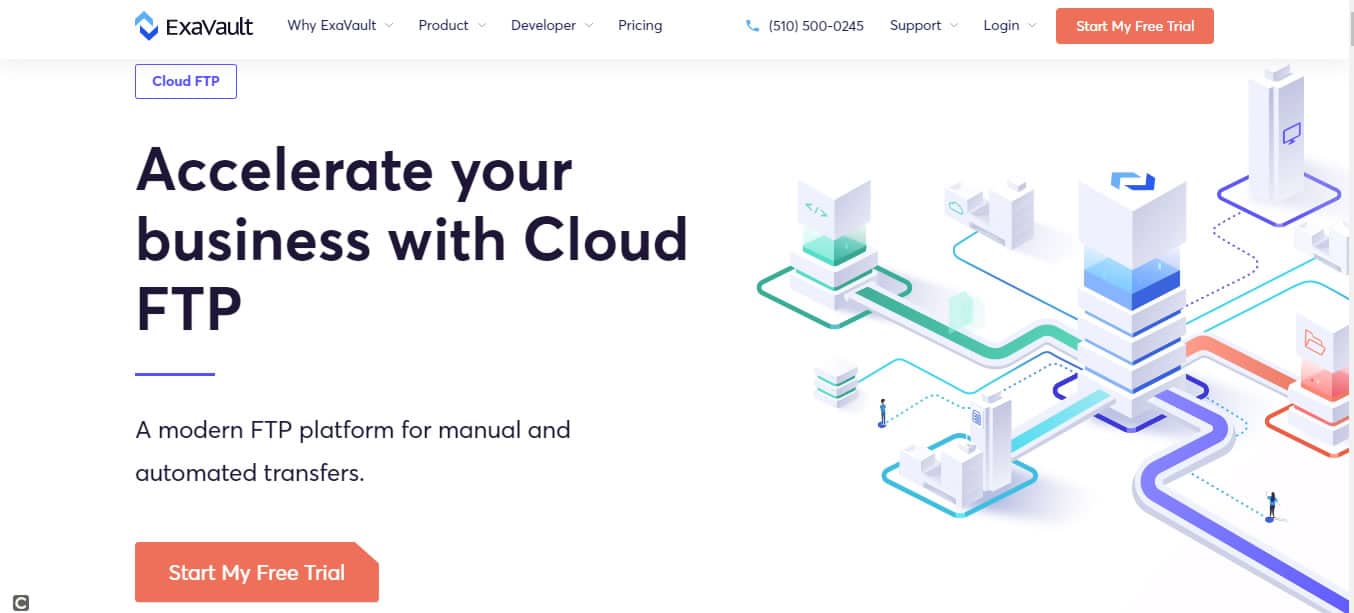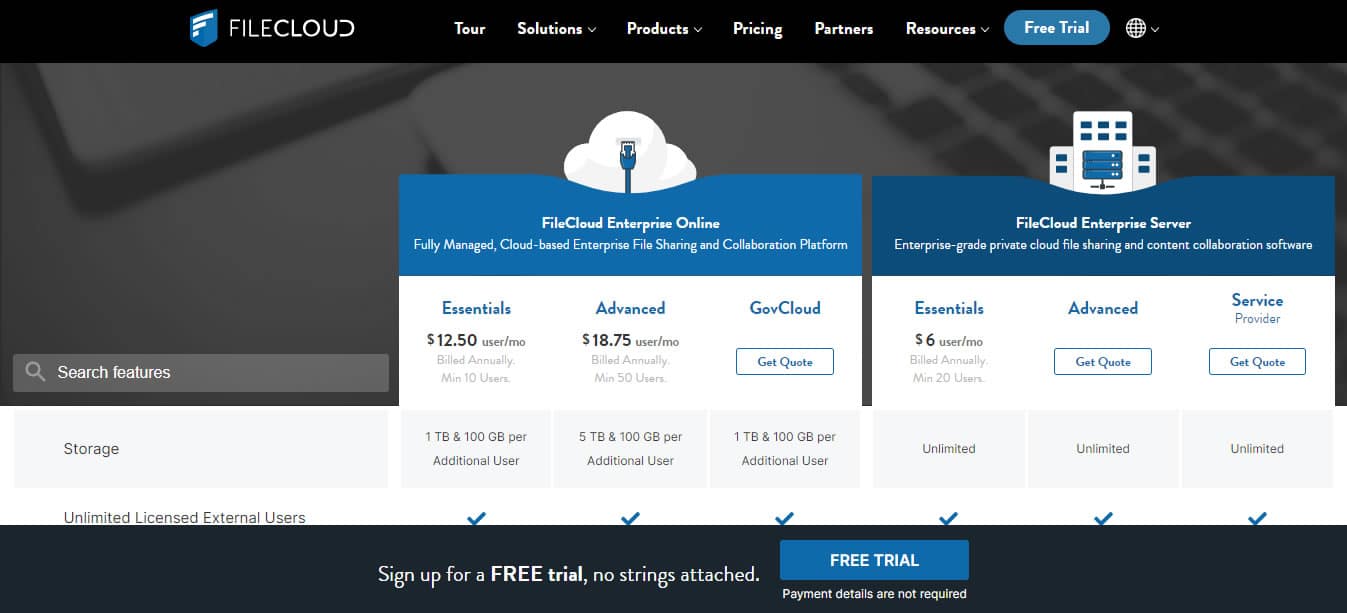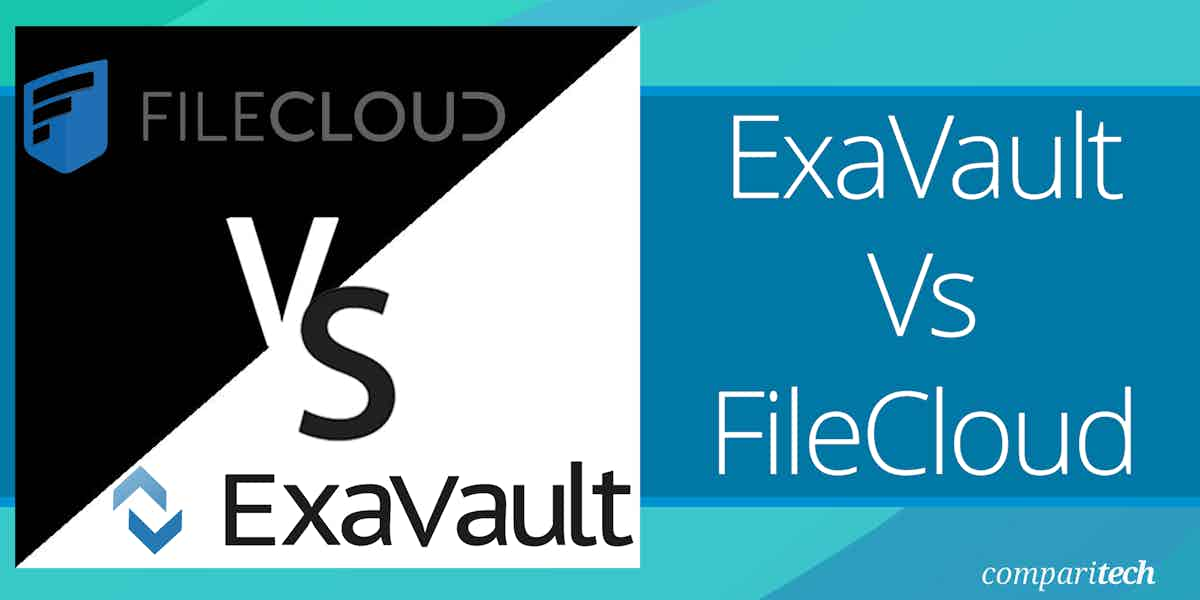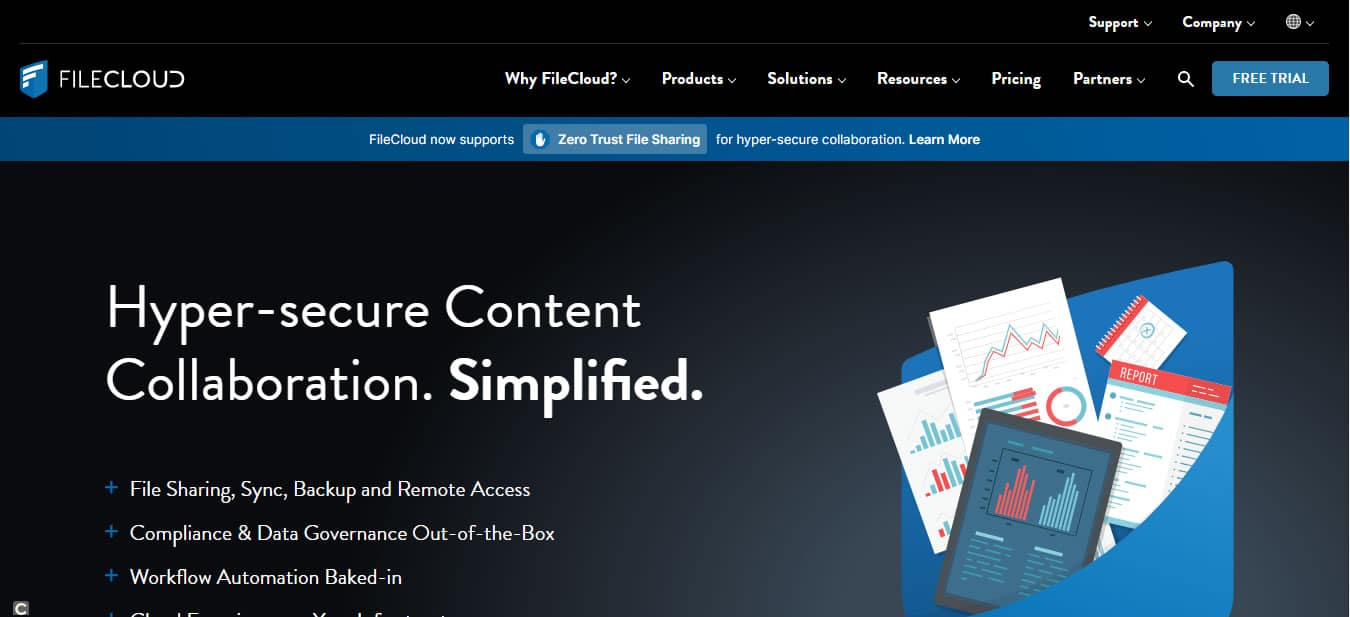Overview of ExaVault
ExaVault is a cloud-hosted FTP platform that enables organizations to securely store, transfer, and share files between users, teams, and organizations. The ExaVault FTP solution provides a robust and secure environment for transferring files over the Internet. It offers a range of features and functionalities that cater to the needs of businesses and individuals who require a reliable and user-friendly file transfer system. ExaVault is targeted at SMB and mid-market businesses and provides support for FTP, SFTP, FTPS, and FTP-SSL protocols. If you or your organization frequently works with large files and requires a reliable and efficient file transfer system, ExaVault is an excellent choice.

In March 2022, ExaVault was acquired by Files.com — a U.S.-based cloud-native Managed File Transfer (MFT) service. However, according to ExaVault, it will continue to operate as a standalone platform in the short term, over the year until it is fully merged with Files.com platform. Thereafter, ExaVault existing customers will be migrated onto the unified platform, and will get the following additional capabilities and benefits included with their subscription:
- SOC-2 compliance
- Global footprint: Your choice of 7 regions for file storage, including Europe, the UK, Australia, Japan, and Singapore
- Built-in Microsoft Office integration, supporting real-time co-editing
- Stronger security features, including encryption at rest, 3 more types of 2FA, and more compressive controls around IP lists, keys, and passwords
- Granular permissions capabilities
- Desktop app (Windows and Mac)
- Mobile App (iOS and Android)
- Command line app, better API, and SDKs for 6 languages
- Higher quality, instant search results
Exavault offers a free 10-day trial with full access to the entire platform, including all integrations, automations, protocols, and APIs. When you’re ready to buy, your trial environment will seamlessly convert into your paid environment.
Overview of FileCloud
FileCloud is a U.S.-based content collaboration platform (CCP) that offers file sharing and synchronization capabilities on public, private, and hybrid clouds. FileCloud is ideal for organizations that are looking to implement enterprise file sharing and remote access to files across devices and platforms. Other common use cases include cloud file servers, self-hosted file-sharing services, virtual data rooms, content services platforms, enterprise records management, white label file sharing and sync, FTP service replacement, and partner file sharing portal, among others.
FileCloud application comes in two flavors:
- FileCloud Enterprise Online A fully managed, cloud-based enterprise file-sharing and collaboration platform. FileCloud Enterprise Online has servers across multiple geographical regions across the globe to support your data residency regulatory requirements. There’s also an AWS GovCloud option for organizations that work directly with the U.S. government.
- FileCloud Enterprise Server An enterprise-grade private cloud file-sharing and content collaboration software. It allows you to run your own private Dropbox-like file sharing and sync solution, integrated with your IT infrastructure and storage. This is ideal for organizations that want to have complete control over their data.
FileCloud offers a variety of features, including the ability to integrate with your existing file server, and the ability to lock files to avoid conflicting changes. Other features and capabilities include, but are not limited to:
- Alerts users when shared files or folders are changed
- Allows access to files from iOS and Android
- Mounts your remote files as a network share in Windows Explorer
- Public and private sharing with expiration dates and other global policies
- Highly customizable to reflect the organization’s brand
- Multi-Tenancy architecture for Managed Service Providers (MSPs) and large enterprises
- Helps you comply with various regulatory standards such as HIPAA, GDPR, and others.
A free 15-day trial of FileCloud online, and a free 30-day trial of FileCloud server are available on request.
ExaVault vs. FileCloud: How They Compare
Installation and Setup
ExaVault is a cloud-based FTP application, which means there are no installation hassles other than the usual sign-up process using an internet-connected device with a supported browser. The sign-up process is straightforward and can be completed in a few simple steps as shown below:
- Sign up and create an account Visit the ExaVault website and sign up for an account. You will need to provide your basic information and choose a subscription plan that suits your needs.
- Set up your workspace After signing up and logging in, you will need to set up your workspace. A workspace in ExaVault is essentially a container for your files and folders. You can create multiple workspaces based on your requirements, such as for different projects or clients.
- Configure user accounts As the account administrator, you can create user accounts for yourself and others who will be accessing the ExaVault platform.
- Connect to ExaVault Connect to ExaVault using your favorite FTP client software. Once connected, you can start transferring files to and from your ExaVault workspace.
FileCloud offers a flexible deployment option. The FileCloud Enterprise Online is a fully managed cloud service, which means there are no installation hassles other than the usual routine sign-up process. On the other hand, the FileCloud Enterprise Server requires installation on your infrastructure either locally on Windows and Linux servers (Debian/Ubuntu, CentOS/Red Hat) or on your AWS or Azure cloud server with full control of your data. This deployment model is ideal for organizations that want to have granular control, but it comes at a cost—you need to have all the human and material resources to manage it in-house.
Cloud Storage and Backup
Exavault isn’t designed for online storage and backup, but it performs this function indirectly. It is primarily a cloud-based managed file transfer application, which means its focus is on the secure transfer of files. This also implies that the huge amount of file data that passes through the Exavault network for file transfers is also securely stored on their cloud storage servers around the world. Uploading files, copying files, creating, or updating new versions all contribute to additional storage usage. ExaVault also allows you to create folders and subfolders within your workspace, enabling you to organize your files and maintain a structured file hierarchy. This makes it easier to locate and manage your files efficiently.
Similarly, FileCloud isn’t a dedicated online storage and backup service. Nonetheless, the fact that it offers file sharing and synchronization services allows it to also provide file storage and backup services. If you need a dedicated online backup solution, check out our best online backup and storage solution. FileCloud allows you to back up and restore files across all platforms, and to access them from anywhere. It comes with features such as file versioning, automatic media backup from mobile devices, and a backup scheduler.
Collaboration and Sharing
The real power of Exavault is made manifest when it comes to business-critical managed file transfer workloads. Within ExaVault’s user-friendly web-based interface, you can conveniently send files, share folders, receive files, and perform various tasks effortlessly. The intuitive design allows for seamless navigation, and the drag-and-drop feature simplifies the organization of your files. All your files and folders are accessible in a single, easy-to-manage interface. With streamlined file transfer operations, you can search, click, and share files effortlessly, enabling efficient collaboration and productivity.
A shared folder allows you to let outside parties access a folder in your account (including any files and nested subfolders) using just a link. A file send lets you send one or more files via an easy download link. File sends are different from shared folders because file sends are ‘point in time’-the recipient will get the files as you sent them. Sharing a folder with customers or colleagues is as simple as a single click, instantly generating a unique URL for the shared folder. You can conveniently send invitations via email or instant message to grant access to the shared folder directly from the interface.
In terms of performance, the ExaVault FTP platform excels at providing fast and efficient file transfers. It leverages multiple data centers strategically located around the world, ensuring that users experience reliable and speedy transfers regardless of their geographic location. This makes it an ideal solution for businesses with global operations or remote teams that need to exchange large files quickly.
For Dropbox, hosting your files with them means you can also share them easily with others. When you put files in the Dropbox folder, Dropbox automatically syncs them everywhere, so they’re available on any internet-connected machine where you’ve installed Dropbox or that has a web browser. Just like most file-sharing applications, Dropbox allows you to securely share files with users across the internet, including the ability to set permissions such as who can access it, what you can do with it, and for how long (file expiration dates).
For FileCloud, hosting your files on their platform means that you can also share them easily with others. When it comes to file-sharing and collaboration, FileCloud’s performance and the set of options available are quite impressive. It allows you to securely share folders and documents with users across the internet by using links and URLs that FileCloud generates for you. Unlike other services, FileCloud enables you to customize these links by letting you rename the URLs to get rid of those random alphanumeric characters. You can also change the share permissions by allowing everyone or only select users to access the share. Once you’re done with link customization and permissions, you can then choose to copy or send the link via email or other channels.
There is no specific file size limitation in FileCloud. You can share large-size files running into gigabytes with users inside and outside your organization and also have conversations around those shared files. You can also restrict the types of files that can be shared or uploaded, and design custom workflows to automate business processes. All these are geared towards enhancing your sharing and collaboration experience.
Integrations and Extensions
With ExaVault’s RESTful API, you have complete control and the ability to automate various aspects of your account. This powerful API empowers you to perform tasks such as creating new users, transferring files, retrieving activity logs, and more. Additionally, ExaVault offers built-in webhooks that provide programmatically triggered notifications whenever changes occur. You can leverage web or FTP connections to seamlessly transfer files, and orchestrate all of these functionalities seamlessly using the ExaVault API.
FileCloud’s approach to integration is mostly geared towards providing access to third-party productivity, cloud hosting, and security tools. As an enterprise file-sharing service, one would expect to see integration support for a wide array of native and third-party productivity tools to boost collaboration. Instead, what it does offer is a Microsoft Office integration, so you can preview and edit Office files, which of course requires an Office 365 subscription to edit those files. However, there is integration support for Apple, AWS, Digital Ocean, Salesforce, SIEM tool, and other security tools, but they’re mostly available for the “enterprise” editions. Nonetheless, FileCloud just like ExaVault provides FileCloud Developer API with the tools necessary to build a variety of apps and clients. This allows the extensibility and integration of FileCloud with your existing enterprise systems and frameworks.
Security and Privacy
ExaVault prioritizes data security by implementing advanced encryption protocols during file transfers and storage. This ensures that your files are protected from unauthorized access and interception. The platform utilizes industry-standard encryption protocols to protect data during transit, ensuring that files are securely transferred between parties. Additionally, ExaVault offers advanced user management features, allowing administrators to set user permissions and control access to specific files and folders.
ExaVault provides support for user permissions (read-only, write-only, limit sharing, restrict to home folder, expire user), global permissions (Limit to FTPS/SFTP, IP restrictions, require two-factor authentication, comprehensive audit logs), and share permissions (expire share, password protection, require an email to access, download only mode, delivery receipts). Shared folders can be restricted; e.g., with an expiration date, password, download-only, etc. Share access logs let you review who’s done what, who has been in the share when it was created, and if any files have been downloaded, to meet regulatory requirements.
Similarly, FileCloud comes with essential security features such as two-factor authentication (2FA), single sign-on (SSO), heuristic file content scanning engine to detect and block Ransomware, SIEM integration to monitor FileCloud alerts and audit events, data loss prevention in real-time, encryption for data at rest and in motion, among others. The security features are so much that there is hardly any security function that you’re looking to perform that is not available in FileCloud. However, when it comes to data encryption, FileCloud manages your key if you choose to store files on its servers, which gives it the power to decrypt your files and hand them over to law enforcement if the need arises. But if you self-host, you will be able to manage your encryption key and secure it with your own password to gain control of your privacy.
Licensing and Price Plans
ExaVault offers affordable pricing options for businesses of all sizes. Its pricing plans are broken into Starter, Power, and Premier price plans as shown in the table below.
| Features | Starter | Power | Premier |
|---|---|---|---|
| Minimum User Commitment | 5 | Minimums Apply | Minimums Apply |
| Monthly Usage Included | 1 TB | 5 TB | 10 TB |
| Daily API Request Limit | 50,000 | 250,000 | 2,000,000 |
Table 1.0 | Exavault Price Plans
Plan pricing is partially based on user count, which means that you must commit to a minimum number of users. Charges are based on one total monthly number called “Usage,” representing your total billable usage of the Exavault service. This “Usage” number is the sum of your “Storage Usage” and your “Transfer Usage”.

FileCloud licensing and price plans are grouped according to the Server and Online editions of the software. The FileCloud Enterprise Online comes in three price plans: Essentials ($12.50 user/month), Advanced ($18.75 user/month), and GovCloud (price available on request). The FileCloud Enterprise Server price plans include Essentials ($6 user/month), Advanced (price available on request), and Service Provider plan (price available on request).
L’article ExaVault Vs FileCloud est apparu en premier sur Comparitech.


0 Commentaires